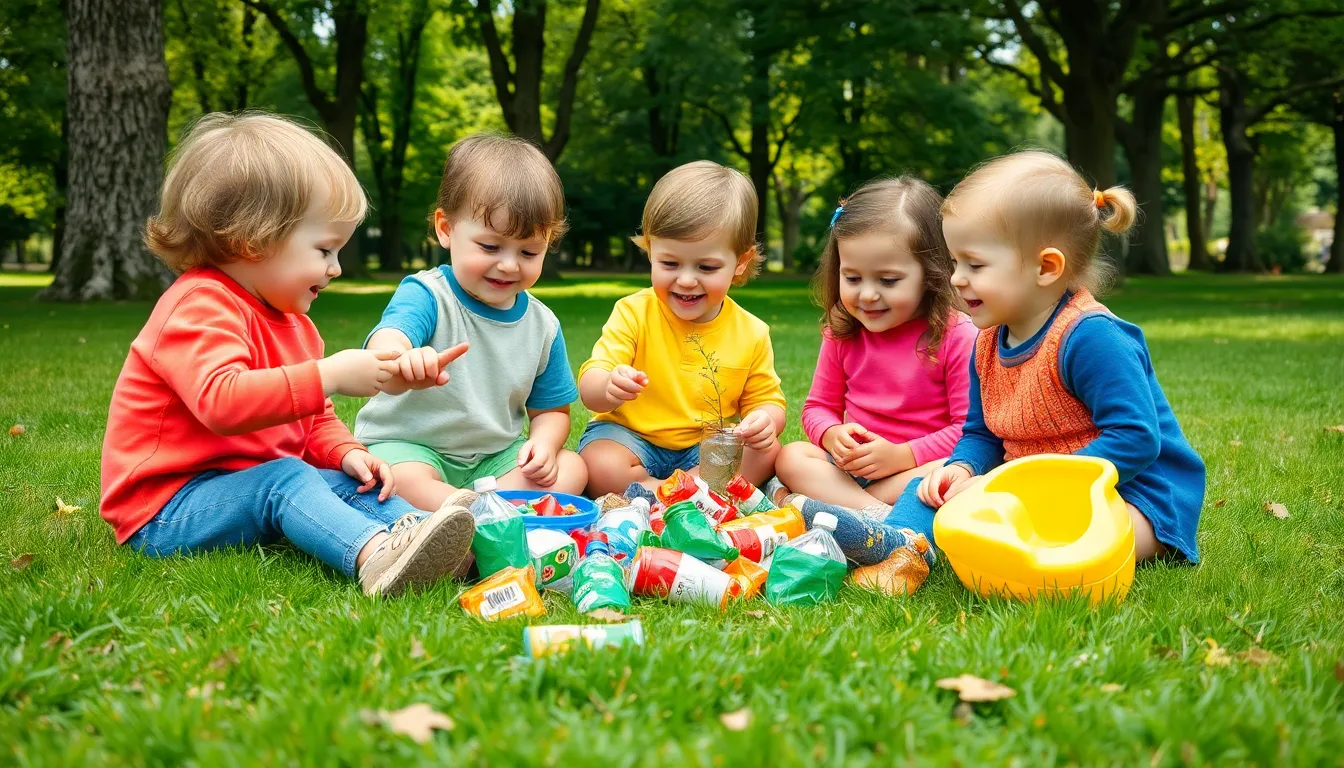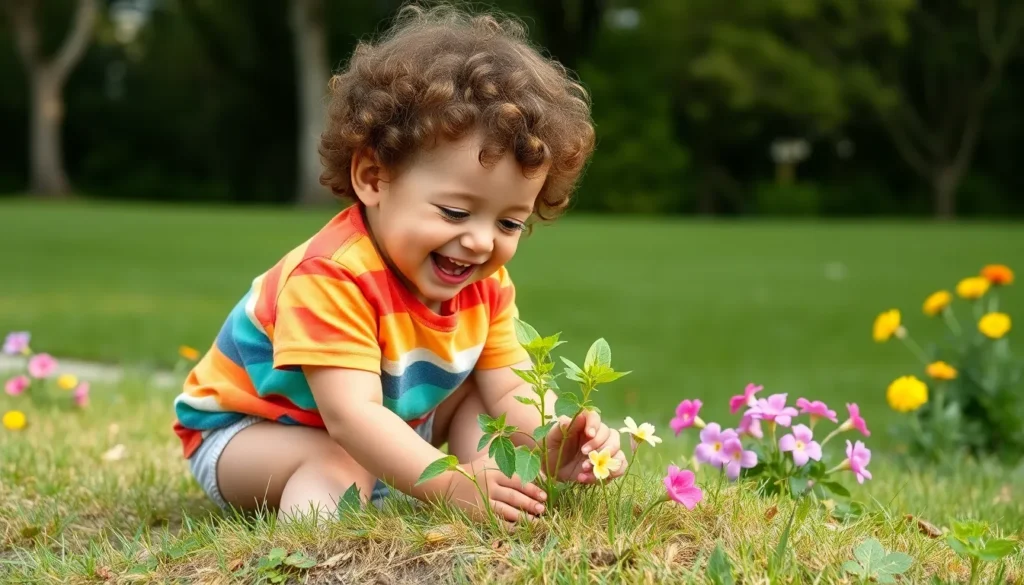In a world increasingly focused on sustainability, introducing environmental learning to toddlers can spark a lifelong passion for nature. Early childhood is a crucial time for developing awareness and appreciation for the environment. By engaging young minds with hands-on activities and playful exploration, parents and educators can instill a sense of responsibility towards the planet.
Toddlers are naturally curious, making them ideal candidates for environmental education. Simple lessons about recycling, plant growth, and wildlife can lay the foundation for eco-conscious habits. As they discover the wonders of the natural world, children not only learn but also cultivate empathy for living things. This journey into environmental learning can shape their values and behaviors, ensuring a greener future for generations to come.
Table of Contents
ToggleUnderstanding Environmental Learning
Environmental learning focuses on teaching toddlers about the natural world, fostering awareness and responsibility from an early age. This education serves as a foundation for future environmental values and sustainable practices.
Definition and Importance
Environmental learning refers to educating young children about their environment and the importance of nature. It equips them with knowledge about ecosystems, conservation, and sustainability. Engaging in environmental learning during early childhood enhances critical thinking and problem-solving skills, creating a generation capable of addressing ecological challenges. Research indicates children exposed to environmental education are more likely to develop environmentally friendly habits as they mature.
Key Concepts in Environmental Learning
- Biodiversity: Understanding various plant and animal species promotes appreciation for nature. Enhancing knowledge of local flora and fauna helps children recognize the importance of protecting ecosystems.
- Sustainability: Learning about the responsible use of resources instills respect for the environment. Activities like recycling and reducing waste teach children how their actions impact the planet.
- Nature Exploration: Hands-on experiences encourage curiosity and connection with nature. Outdoor activities, such as nature walks and gardening, stimulate exploration and promote physical health.
- Environmental Stewardship: Instilling a sense of responsibility towards the environment fosters empathy. Encouraging children to care for animals and plants nurtures a compassionate worldview.
- Climate Awareness: Introducing concepts related to weather patterns and climate change prepares children for future environmental challenges. Simple discussions about weather and seasons can enhance their understanding of larger ecological issues.
Benefits of Environmental Learning for Toddlers

Environmental learning offers numerous advantages for toddlers, significantly enhancing their development across various domains. Engaging with nature and environmental concepts builds a strong foundation in critical areas such as cognitive skills and social development.
Cognitive Development
Cognitive development benefits through active engagement with the environment. Through exploration, toddlers enhance problem-solving skills and critical thinking. Learning about ecosystems introduces concepts like cause and effect, as they observe interactions within nature. For instance, watching a plant grow teaches them about life cycles and responsibility. Activities such as sorting recycling materials reinforce categorization and early math skills. Hands-on experiences stimulate curiosity, leading to a deeper understanding of scientific principles from an early age.
Social Skills Enhancement
Social skills enhancement occurs as toddlers participate in group activities focused on environmental themes. These activities promote teamwork and communication, fostering cooperation among peers. Sharing ideas about nature encourages dialogue and helps develop listening skills. Participating in community clean-up events introduces empathy for living things and cultivates a sense of collective responsibility. Environmental learning offers opportunities for toddlers to connect with others, enhancing their ability to form relationships and work collaboratively.
Effective Strategies for Environmental Learning
Engaging toddlers in environmental learning involves using effective strategies that promote interaction with nature. The following methods enhance this learning experience.
Outdoor Activities
Outdoor activities facilitate direct engagement with the environment. Exploring parks, gardens, or natural reserves exposes toddlers to various ecosystems. Activities such as planting seeds, observing insects, or collecting leaves enhance sensory experiences, helping children understand biodiversity. Nature walks encourage curiosity about plants and animals, fostering observational skills. Simple games, like scavenger hunts, allow toddlers to discover and identify local flora and fauna, reinforcing their connection to the environment.
Interactive Learning Tools
Interactive learning tools play a crucial role in environmental education. Multimedia resources such as apps and videos present environmental concepts in engaging formats. Simple educational games focused on recycling teach toddlers responsibility and resource management. Storybooks that feature themes of sustainability and nature help build vocabulary while instilling environmental values. Additionally, hands-on materials, like magnifying glasses or nature kits, promote exploration, inviting children to examine their surroundings closely. These tools enrich learning experiences and encourage a proactive approach to environmental stewardship.
Implementing Environmental Learning at Home
Creating a home environment that promotes environmental learning is crucial for toddlers. Parents can implement various strategies to introduce sustainable practices and foster a connection to nature.
Creating a Green Space
Designing a green space at home encourages toddlers to explore and engage with nature. Parents can:
- Plant a garden: Choose easy-to-grow plants, such as herbs or flowers, allowing toddlers to participate in planting and watering.
- Incorporate recycling stations: Establish clearly labeled bins for paper, plastic, and organic waste, teaching toddlers the importance of recycling.
- Create a nature corner: Use a small shelf or area to display natural items like rocks, leaves, and pinecones, stimulating curiosity and exploration.
These elements create a tangible connection between indoor activities and the natural environment.
Incorporating Nature in Daily Routines
Integrating nature into daily routines offers continuous opportunities for environmental learning. Families can:
- Take nature walks: Explore local parks or neighborhoods, encouraging toddlers to observe plants and animals while practicing vocabulary.
- Incorporate environmental themes into meals: Discuss where food comes from while prepping meals, linking the food source to sustainable practices and local farming.
- Prioritize outdoor play: Set aside time each day for outdoor activities like scavenger hunts, promoting physical activity and environmental awareness.
Implementing these routines builds a consistent foundation for learning about nature and sustainability.
Fostering environmental learning in toddlers lays the groundwork for a future generation that values and protects nature. By engaging young minds through hands-on experiences and interactive activities, parents and educators can inspire a deep connection to the environment. This early education not only nurtures curiosity but also equips children with essential skills to navigate ecological challenges.
Creating opportunities for exploration and learning helps toddlers develop empathy and responsibility towards living things. As they grow, these foundational lessons will shape their attitudes and actions regarding sustainability. Ultimately, instilling a love for nature in these formative years ensures that children become informed stewards of the planet, ready to contribute positively to a more sustainable world.



